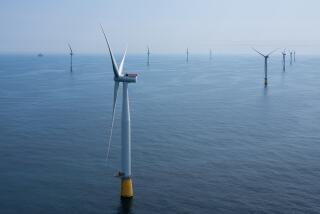To drill or not to drill?
Today’s question: Why did the American political class come to a consensus so quickly on the need for offshore drilling? All week, Cato Institute senior fellow Jerry Taylor and Center for Energy Efficiency and Renewable Technologies Executive Director V. John White debate U.S. energy security.
Offshore drilling is a risk worth taking
Point: Jerry Taylor
John, it’s no mystery why politicians are interested in opening up the areas off our coasts to oil exploration and development. Four-dollar gasoline has driven Americans to near madness, and the public’s fervent wish to bring down gasoline prices is the politician’s command. Adding new supply to the market is one sure-fire, hard-to-argue means of doing exactly that.
The U.S. Energy Information Administration (EIA) -- an analytic arm of the U.S. Department of Energy -- reported last year that removing all offshore drilling restrictions would liberate about 18 billion barrels of petroleum at a rate of about 200,000 barrels a day. About 10 billion barrels of that oil, however, is thought to be off the California coast, which is important to keep in mind given John McCain’s caveat that states should be allowed to say “no” to drilling in federal waters off their coasts.
If the EIA is right, John, then you’re right to argue that we’re talking a trivial amount of new crude in global terms. Global oil production last year averaged about 86 million barrels per day. If global oil production were at that rate when this new 100,000 barrels of oil hit the market (roughly the EIA’s estimate minus California), it would increase global supply by all of one-tenth of 1%. If the oil market reacts then as it has in the past when new supply hits the market, this would translate into reduction of one-fifth of 1% in world crude oil prices over the long term. Even if California were to allow drilling, we’re still well short of even a 1% reduction in price.
But the EIA may not be right about the extent of the oil at issue.
First, the EIA determined what was technically recoverable in part by estimating how much of this new oil could be economically exploited were prices at $50 a barrel in 2005 dollars. If we assume that oil prices will be higher in the future, then what is “technically recoverable” will surely go up.
Second, most of the waters in question have never been thoroughly explored. How much economically recoverable crude oil is yet to be found in the 85% of U.S. coastal waters currently off limits to the industry is thus unknowable. We can guess, of course, but those guesses are based on very limited information.
But, John, think twice before arguing that there’s probably not enough undiscovered oil off shore to substantially reduce gasoline prices. Only monster fields cross that threshold, and if we eschewed drilling everywhere else, global oil production would only be a fraction of what it is today. Likewise, arguing against drilling because the oil will take a decade or more to come to market in significant volumes -- which is likely correct -- is an argument against acting today to head off problems tomorrow.
You might, of course, want to argue that the environmental risks are greater than the energy rewards. For the sake of argument, let’s assume that the EIA is right and 18 billion barrels of oil are at stake. And let’s further assume that the oil could be sold for an average price of $100 a barrel. How likely is it that the cost of the environmental damages associated with this incremental increase in oil production would exceed $1.8 trillion? If it did not, then the environmental risks were worth taking.
Jerry Taylor is a senior fellow at the Cato Institute.
Putting off a real solution
Counterpoint: V. John White
Jerry,
The problem with putting the focus on drilling is that it postpones meaningful action on, or even discussion of, long-term responses to the oil supply problem. It’s like arguing about prescribing aspirin for someone needing brain surgery.
Are there a few more places in the world from which we can extract a bit more oil? Of course there are. As the polar ice caps of the Arctic Ocean melt away, we can expect a rush to exploit those waters as well as coastal waters farther south. But no reasonable analyst thinks that Arctic oil will offset depletion of existing fields.
The best we can hope for is that mining the remaining dregs will give us a bit more time to deal with the oil-supply problem. But every day we spend arguing about drilling is another day we don’t address the real problem: How is the world going to adapt to less oil in the future?
Global supplies have not increased in more than three years despite very attractive prices. That is what we should be worrying about. Arguing about whatever additional small amounts we can squeeze out of the U.S. won’t change the dismal oil-supply picture. Long term, we’re going to have to use less energy for transportation, and it’s going to have to come from sources other than coal.
California hasn’t just said “no” to more offshore drilling. In contrast to the stunning failure of our national government, California has pursued energy and environmental policies that have accelerated the development of ultra-low emission, electric-drive technologies. The state has also integrated energy efficiency into the heart of utility portfolios and laid the foundation for a major shift to renewable energy. We have been undermined and every step of the way by the federal government, which has been aided and abetted by the fossil-fuel lobby and the death wish of the U.S. auto industry.
Other states are joining California in shifting the focus from fossil-fuel extraction to renewables. Colorado is facing huge environmental costs from fossil fuels and has recognized the economic and investment potential of renewable resources. Today’s front-page Washington Post story by reporter Peter Slevin discusses how Colorado voters and the Legislature have put the state on the path toward more renewables and fewer tax-breaks for the fossil-fuel industry. There’s tangible evidence of benefits to Colorado’s economy: Earlier this year, Danish company Vestas Wind Systems opened a turbine manufacturing plant in the state.
As you point out, Jerry, more drilling won’t make any appreciable difference in the price of oil or the price at the pump. Furthermore, any new oil extracted from currently prohibited areas would take more than 10 years to trickle onto the world market. We have a far better chance of affecting U.S. and global oil demand by rapidly accelerating investment in renewable energy development and electric-drive technologies such as plug-in hybrids.
V. John White is executive director of the Sacramento-based Center for Energy Efficiency and Renewable Technologies.
Day 1 | | | |
More to Read
A cure for the common opinion
Get thought-provoking perspectives with our weekly newsletter.
You may occasionally receive promotional content from the Los Angeles Times.






